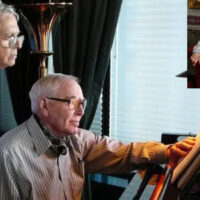Allen Klein & Bliss Hebert: A Lifetime of Making Opera

ALLEN CHARLES KLEIN (1938-2023) a native New Yorker, studied painting and sculpture at the Art Students League and New Yorks’ High School of Music and Art. He completed his studies in theatre design at Boston University under Horace Armistead and Raymond Sovey.
Mr. Klein is the only American designer to have focused his career exclusively to the production of design for the opera stage, and together with Bliss Hebert as director, has created more than seventy new productions as well as working with directors in Germany, Austria and Great Britain.
His work has been seen in America in virtually every opera house including, San Francisco, Dallas, Santa Fe, Seattle, Portland, Houston, Baltimore, Miami, San Diego, Detroit, Vancouver, Toronto, Montreal, Mexico City and the Metropolitan Opera.
In Europe, Mr. Klein has designed productions for the Scottish Opera, Edinburgh Festival, Opera Northern Ireland, the Glyndebourne Festival, Deutsche Oper Berlin, and the Vienna State Opera. His work has also been seen on the stages of the Schwetzingen Festival, Frankfurt Oper, Barcelona and Madrid Operas, and at the Teatro alla Fenice in Venice.
BLISS HEBERT (b.1930) has staged over three hundred productions of one hundred operas with forty-one different opera companies. Among the companies for which he has directed are the Metropolitan Opera, the New York City Opera, the Santa Fe Opera (of which he was a founding member), the Caramoor Festival, the Canadian Opera and the companies of Baltimore, Chicago, Cincinatti, Los Angeles, Houston, New Orleans, Dallas, Montreal, Milwaukee, Philadelphia, Mexico City, Belfast, Boston, Portland, Seattle, Miami, Tulsa, San Francisco, Fort Worth, San Diego, Washington, Vancouver, Edmonton, Detroit, and Atlanta.
He was Artistic Director and General Manager of the Washington D.C. Opera for four years.
A native of Faust, New York, Mr. Hebert began his study of piano at the age of three and at five was appearing in solo recitals. Planning a career as a concert pianist, he continued his musical studies at Syracuse University where he received a B.A. and Master of Music degrees. He was a piano pupil of Robert Goldsand and Helene Barrere in New York City and of Lelia Gousseau in Paris.
After serving in the United States Army in France as conductor of a prize-winning chorus, he returned to the United States and made his debut in Santa Fe directing Stravinsky’s “The Rakes’ Progress”. This was the beginning of a long collaboration with Igor Stravinsky. Mr. Hebert prepared many of Stravinsky’s vocal works for recordings which were conducted by the composer. He has staged sixteen different productions of Stravinsky’s operas, many of which were conducted by the composer.
Mr. Hebert’s productions of Stravinsky’s “Le Rossignol” and “Oedipus Rex” appear on Sony Records. In addition, he is chorus master on the Columbia recording of “Boris Godunov” highlights with George London. On other Columbia recordings he is heard as pianist and harpsichordist in works of Bach, Schoenberg and Berg. Mr. Hebert works extensively with designer Allen Charles Klein. Together they have created more than fifty opera productions.
The videos below are organized by Success Factor, and run between 30 seconds and 15 minutes. Click on any video. You must be connected to the Internet to view the videos.
EXPOSURE TO BROAD INFLUENCES: 1:29 min.
EXPOSURE TO BROAD INFLUENCES: 2:15 min.
INSIGHT & INSPIRATION: 4:00 min.
CRITICAL THINKING: 0:52 sec.
INSIGHT & INSPIRATION: 0:53 sec.
SEIZES OPPORTUNITIES: 5:27 min.
SERENDIPITY: 3:33 min.
SERENDIPITY: 3:19 min.
OPEN TO CHANGE, FLEXIBILITY: 2:31 min.
CRITICAL THINKING: 3:02 min.
CRITICAL THINKING: 1:00 min.
SEIZES OPPORTUNITIES: 7:44 min.
CRITICAL THINKING: 8:07 min.
UNDERSTANDS THE BUSINESS OF ART: 14:23 min.
UNDERSTANDS THE BUSINESS OF ART: 5:13 min.
UNDERSTANDS THE BUSINESS OF ART: 0:57 sec.
CREATES A UNIQUE PERSONAL BRAND: 3:29 min.
UNDERSTANDS ARTISTS’ NEEDS: 2:52 min.
EMPATHY: 1:43 min.

